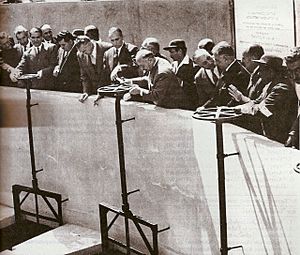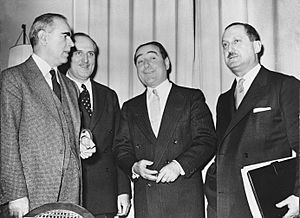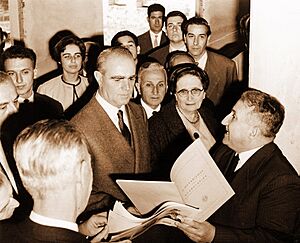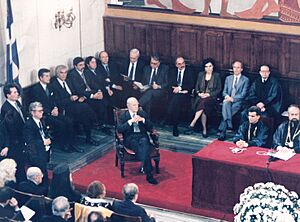Konstantinos Karamanlis facts for kids
Quick facts for kids
Konstantinos Karamanlis
Κωνσταντίνος Καραμανλής |
|
|---|---|
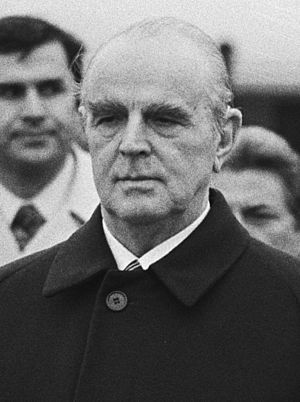
Karamanlis in 1978
|
|
| President of Greece | |
| In office 5 May 1990 – 10 March 1995 |
|
| Prime Minister | Konstantinos Mitsotakis Andreas Papandreou |
| Preceded by | Christos Sartzetakis |
| Succeeded by | Konstantinos Stephanopoulos |
| In office 10 May 1980 – 10 March 1985 |
|
| Prime Minister | Georgios Rallis Andreas Papandreou |
| Preceded by | Konstantinos Tsatsos |
| Succeeded by | Ioannis Alevras (Acting) |
| Prime Minister of Greece | |
| In office 24 July 1974 – 10 May 1980 |
|
| President | Phaedon Gizikis Michail Stasinopoulos Konstantinos Tsatsos |
| Preceded by | Adamantios Androutsopoulos |
| Succeeded by | Georgios Rallis |
| In office 4 November 1961 – 17 June 1963 |
|
| Monarch | Paul |
| Preceded by | Konstantinos Dovas |
| Succeeded by | Panagiotis Pipinelis |
| In office 17 May 1958 – 20 September 1961 |
|
| Monarch | Paul |
| Preceded by | Konstantinos Georgakopoulos |
| Succeeded by | Konstantinos Dovas |
| In office 6 October 1955 – 5 March 1958 |
|
| Monarch | Paul |
| Preceded by | Alexander Papagos |
| Succeeded by | Konstantinos Georgakopoulos |
| Personal details | |
| Born | 8 March 1907 Proti, Salonica Vilayet, Ottoman Empire (now Greece) |
| Died | 23 April 1998 (aged 91) Athens, Greece |
| Political party | People's Party (1936–1951) Greek Rally (1951–1955) National Radical Union (1955–1963) New Democracy (1974–1998) |
| Spouse |
Amalia Kanellopoulou
(m. 1951; div. 1972) |
| Relations | Kostas Karamanlis (nephew) |
| Alma mater | University of Athens |
| Signature |  |
Konstantinos Karamanlis (born March 8, 1907 – died April 23, 1998) was a very important leader in Greece. He served as the country's Prime Minister four times and as President twice. His political career lasted for most of the second half of the 20th century.
He was the longest-serving Prime Minister in modern Greek history, holding the position for about 14 years. During his first time as Prime Minister (1955-1963), he focused on making Greece's economy stronger. He helped industries grow, built new roads and buildings, and improved farming. This led to a period of fast economic growth for Greece after World War II. He also made sure that women had full voting rights, which had been approved earlier but not fully put into action.
Later, after 1974, he is remembered for bringing democracy back to Greece. The country had been ruled by a military government (called a junta) for several years. Karamanlis helped end this military rule and set up the Third Hellenic Republic, which brought political stability after many years of problems.
Karamanlis strongly believed in Greece being part of Europe. He played a key role in Greece joining the European Communities, which later became the European Union. In 1978, he received the Charlemagne Prize, a special award for people who help unite Europe. His supporters often called him Ethnarches, meaning "National Leader."
Contents
Early Life in Greece
Konstantinos Karamanlis was born in a village called Proti, near the city of Serres. At that time, this area was part of the Ottoman Empire. He became a Greek citizen in 1913, after the region of Macedonia became part of Greece following the Balkan Wars.
His father, Georgios Karamanlis, was a teacher who fought to help Macedonia become part of Greece. Konstantinos spent his childhood in Macedonia. Later, he moved to Athens to study law at the University of Athens.
After finishing his studies, he worked as a lawyer in Serres. He then entered politics with a conservative group called the People's Party. In 1936, at the age of 28, he was elected as a Member of Parliament. He did not fight in the Greco-Italian War because of health issues.
During World War II, when Greece was occupied by other countries, he stayed in Athens and Serres. In July 1944, he went to the Middle East to join the Greek government in exile, which was the Greek government operating outside the country.
First Time as Prime Minister
After World War II, Karamanlis quickly became an important figure in Greek politics. His first job in the government was as Minister for Labour in 1947. In 1951, he joined a new political group called the Greek Rally. When this party won the election in 1951, Karamanlis became the Minister of Public Works. He was praised for how well he built roads and managed aid programs from the United States.
In October 1955, the Prime Minister, Alexandros Papagos, passed away. King Paul of Greece then chose the 48-year-old Karamanlis to be the new Prime Minister. This decision surprised many people because there were other older and more experienced politicians. After becoming Prime Minister, Karamanlis formed his own political party called the National Radical Union.
One of the first important laws he passed as Prime Minister gave full voting rights to women. Although women had nominally gained the right to vote in 1952, Karamanlis made sure it was fully put into practice. He won three elections in a row: in 1956, 1958, and 1961.
In 1959, he announced a five-year plan to improve the Greek economy. This plan focused on growing farming and industry, investing a lot in new buildings and roads, and encouraging tourism. These efforts laid the groundwork for Greece's rapid economic growth after World War II.
Cyprus Independence Agreement
On the international stage, Karamanlis changed Greece's approach to Cyprus. Instead of pushing for Cyprus to unite with Greece, he supported Cyprus becoming an independent country. In 1958, his government started talks with the United Kingdom and Turkey. These discussions led to the Zurich Agreement, which set the stage for Cyprus's independence. In February 1959, the leader of Cyprus, Makarios III, also approved this plan in London.
Joining the European Community
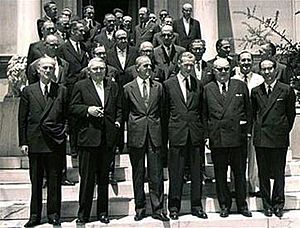
As early as 1958, Karamanlis strongly pushed for Greece to become a member of the European Economic Community (EEC). He saw Greece joining the EEC as a personal dream, believing it was Greece's "European Destiny." He personally talked to European leaders like Germany's Konrad Adenauer and France's Charles de Gaulle. After two years of intense discussions, his efforts paid off.
On July 9, 1961, his government and the European countries signed an agreement for Greece to become an associate member of the EEC. This signing ceremony took place in Athens and was attended by important government officials from the six EEC member countries: Germany, France, Italy, Belgium, Luxembourg, and the Netherlands. These countries were the early foundation of what is now the European Union.
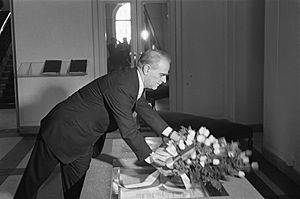
This agreement was very important because it helped end Greece's economic isolation and reduced its reliance on financial and military aid from the United States, mainly through NATO. Greece became the first European country outside the original six to join the EEC as an associate member. The agreement came into effect in November 1962. It planned for Greece to become a full member of the EEC by 1984, after slowly removing all tariffs (taxes) on imports from EEC countries.
The treaty also included a financial plan that provided loans to Greece, totaling about $300 million between 1962 and 1972. This money was meant to help Greece's economy become more competitive before it became a full member. However, this financial aid and the membership plan were paused during the military rule in Greece from 1967 to 1974. During this time, Greece was also removed from the EEC.
Soon after returning to Greece in 1974, Karamanlis restarted his efforts for Greece to become a full EEC member in 1975. He believed that joining the EEC would bring political stability to Greece, which had just transitioned from a dictatorship to a democracy.
In May 1979, he signed the full treaty for Greece to join. Greece officially became the tenth member of the EEC on January 1, 1981. This was three years earlier than originally planned, even though the process had been frozen during the military rule.
Political Challenges and Exile
In the 1961 elections, Karamanlis's National Radical Union party won a majority of the votes. However, the main opposition parties claimed that the elections were unfair due to voter intimidation and other problems. The opposition leader, George Papandreou, started a strong campaign for new and fair elections.
Karamanlis's relationship with the royal family also became difficult, especially with Queen Frederika. They disagreed on several issues, including the royal family's spending and the King's control over the armed forces. When the King refused his advice on a trip to Britain, Karamanlis resigned as Prime Minister and left Greece in 1963.
He used the name Triantafyllides and spent the next 11 years living in Paris, France. His party, the National Radical Union, was then led by Panagiotis Kanellopoulos.
On April 21, 1967, a group of army officers took control of Greece in a military coup. This military government, known as the junta, ruled Greece for several years. Karamanlis was a strong opponent of this military rule while he was in France.
Return to Power
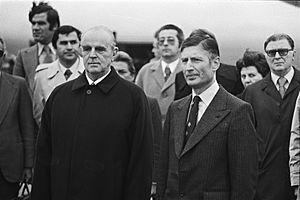
In 1974, the military government collapsed after Turkey invaded Cyprus. On July 23, 1974, the acting President, Phaedon Gizikis, called a meeting of experienced politicians to form a new government that would lead the country to elections.
After much discussion, it was decided that Karamanlis was the best person to lead Greece during this difficult time. When news spread that he was returning from exile, thousands of cheering Athenians went to the airport to greet him, chanting: "He is coming! He is coming!"
Karamanlis was sworn in as Prime Minister. During these first few weeks, he even had to sleep on a yacht protected by a warship, in case there was another attempt by the military to take power. He tried to ease the tension between Greece and Turkey over the Cyprus crisis through diplomacy.
Karamanlis successfully guided Greece from military rule back to a pluralist democracy. During this time, he made the Communist Party of Greece legal again, which had been banned since the Greek civil war. This was seen as a way to bring different political groups together. He also released all political prisoners and pardoned those who had committed crimes against the military government. He announced that free elections would be held in November 1974, just four months after the military government fell.
Establishing the Republic
Inspired by the ideas of French leader Charles de Gaulle, Karamanlis founded a new conservative party called New Democracy. In the 1974 elections, his party won a huge victory with 54.37% of the votes, which is the largest electoral victory in modern Greek history. He became Prime Minister once again.
After the elections, in 1974, a vote was held to decide if Greece should remain a monarchy or become a republic. The people voted to abolish the monarchy and establish a republic. In 1975, the former military dictators were put on trial and received heavy sentences, sending a clear message that military leaders could no longer act above the law. A new Constitution was also written.
In 1977, New Democracy won the elections again, and Karamanlis continued as Prime Minister until 1980. His governments pursued a foreign policy that was more balanced, not just focusing on the US or the Soviet Union.
Under his leadership, the government also took control of many businesses, especially in banking and transportation. This policy, where the state played a large role in the economy, was sometimes called socialmania.
President of Greece
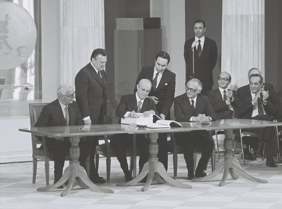
After signing the treaty for Greece to join the European Economic Community (EEC) in 1979, Karamanlis stepped down as Prime Minister. He was then elected President of the Republic by the Parliament in 1980. In 1981, he oversaw Greece's official entry into the EEC as its tenth member.
He served as President until 1985, when he resigned. He was succeeded by Christos Sartzetakis. During a political crisis in 1989, he famously said: "Hellas has been transformed to an endless bedlam," meaning Greece had become a chaotic place.
In 1990, he was re-elected President by a conservative majority in Parliament. He served until 1995, when he was succeeded by Kostis Stephanopoulos.
Later Life and Legacy
Karamanlis retired from politics in 1995, at the age of 88. He had won 5 parliamentary elections, served 14 years as Prime Minister, 10 years as President, and spent more than sixty years actively involved in politics.
For his long service to democracy and his pioneering work in European integration, he received the Charlemagne Prize in 1978. He left his personal papers and records to the Konstantinos Karamanlis Foundation, a research center he had established.
Konstantinos Karamanlis passed away in 1998, at the age of 91, after a short illness.
He married Amalia Megapanou in 1951, but they divorced in 1972 and did not have any children.
His Impact
His nephew, Kostas Karamanlis, later became the leader of the New Democracy party and served as Prime Minister of Greece from 2004 to 2009.
Konstantinos Karamanlis is highly praised for leading Greece during a period of rapid economic growth (1955–63). He is also recognized as the main architect behind Greece's successful entry into the European Union.
His supporters admired him as the charismatic Ethnarches (National Leader). Some critics have pointed to his economic policies in the 1970s, which involved the government taking control of several industries, like Olympic Airways. He has also been criticized for some decisions during the 1974 Cyprus crisis, though it is widely acknowledged that he skillfully prevented a full-scale war with Turkey.
Karamanlis is most remembered for successfully bringing democracy back to Greece after the military rule. He helped heal old divisions in the country by making the communist party legal and by establishing a strong system of parliamentary democracy. His decision to prosecute the military leaders who had taken power sent a clear message that the army was no longer above the law. Karamanlis's policy of European integration also helped Greece become more independent and less reliant on the United States.
Tributes
On June 29, 2005, a special event celebrating Konstantinos Karamanlis's contributions to Greek culture was held at the Odeon of Herodes Atticus. In 2007, many events took place to celebrate 100 years since his birth.
Images for kids
See also
 In Spanish: Constantinos Karamanlís para niños
In Spanish: Constantinos Karamanlís para niños
- List of presidents of Greece
- Politics of Greece
- History of Modern Greece
 | James B. Knighten |
 | Azellia White |
 | Willa Brown |


